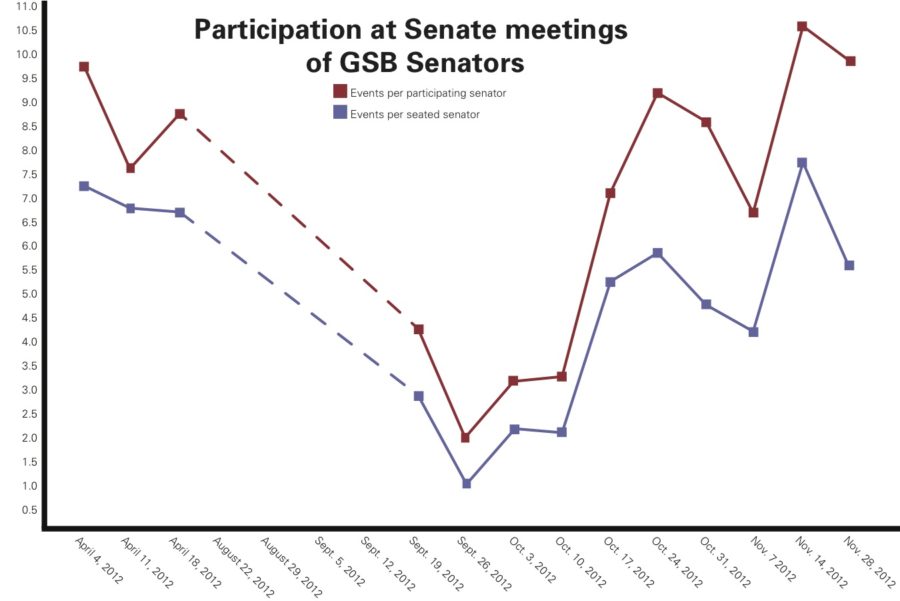Belding: With new semester comes new opportunity for GSB senators to participate more
Graphic: Moriah Smith/Iowa State Daily
Opinion: Belding 1/16 Graphic
January 16, 2013
Taking a place of honor among the announcements and pleas made by incumbent members of the Government of the Student Body, from members of the executive, legislative, and judicial branches, is the plea that students would run for office or somehow involve themselves in GSB. With a recent letter that appeared in this Opinion section, Election Commissioner Adam Guenther did just that. Linking to his letter, GSB tweeted Monday: “Get more involved at Iowa State: Consider running for a Senate or executive position in the upcoming #isugsb elections.” Five hours later, GSB tweeted the link again.
No one can fault these examples (nor any other effort to increase student awareness of GSB). Voter turnout in the GSB elections in March always is around 10 percent of the student body — or less. Even though GSB has a couple million dollars of student fees to dispense with throughout the year through the mandatory fees students pay, many students are oblivious as to GSB’s role in their lives.
Yet membership and involvement are not the same thing. Membership can be either active or passive. Real involvement (when you can answer the question “What do you do?” without casting about for some air filler of an answer), genuine participation, requires speaking up. This is especially so in a legislative body of some kind, which does its job based on the dialogue that takes place among the members at its appointed meetings.
After attending a few meetings in the spring and a few this fall and hearing mostly the same voices, I became curious: To what extent do the senators participate?
Their participation is key since, as the largest group within GSB, they lead by example and, as the legislative branch, make policy.
Using the minutes of the meetings and the rosters Vice President Katie Brown called at each meeting, I recorded each time a senator spoke, made a motion, or otherwise advanced the proceedings (“events”). Making totals by senator, I determined how many times each member of the Senate spoke as well as how many times each participating senator spoke (the latter by dividing the total number of events by the number of senators who spoke rather than the total membership of the body).
Of course, this measure has its problems. The quality of the minutes varies wildly. Since rosters were not available for the first four meetings this fall, I excluded those meetings from the study. The senators are people, and people are more or less shy or reserved. The meetings of the full Senate are but one opportunity to participate in campus affairs, and the meetings compete with committees and other activities. Clearly showing that a job can be done effectively without speaking up, Supreme Court Justice Clarence Thomas broke his famous 7-year silence Monday. But overall, the data show that a small minority of the Senate’s members contribute a huge amount of their meetings’ content. If you ever look for equality of participation, do not even bother looking at the ISU GSB Senate. The top five most participating senators accounted for 42.4 percent of events. The top 10 accounted for 62.3 percent, and the top 15 accounted for 75.4 percent of events.
Usually, there were between one and two more events per participating senator than events per seated senator. In the first session of the current Senate, the meetings from April 4-18, 2012, the events per participating senator numbered, on average, 8.76. Since fewer senators than the whole body participated, the number of events per seated senator is significantly lower, at 7.03. Participation in the second session (fall semester) was worse. Events per participating senator ranged from 2.05 to 10.59, averaging 6.53, and events per seated senator ranged from 1.05 to 7.73, averaging 4.19.
Those numbers are at a basic level good; however, they can only be a starting point. The current Senate has more than three months to affect the lives of their constituents. If GSB members are correct in stating that the actions of GSB, especially those of the Senate, through its power to allocate student fees, have real effects, then why do the senators not participate more?
Perhaps I have a fetish for speaking up and making my voice heard, but observation alone cannot change the world or make an impression upon other people. Only action can do that.
——————————————————————————————-
Michael Belding is a graduate student in history from Story City, Iowa.










